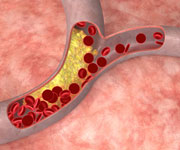AUSTRALIAN experts say there is no need to change the way statins are prescribed for primary prevention of heart disease despite a Cochrane meta-analysis concluding there is not enough evidence to recommend their widespread use.(1)
The experts said the review did not provide information that would warrant changing current prescribing guidelines and that there were proven benefits from the use of statins.(2)
Professor Ian Hamilton-Craig, of Griffith University, and Professor Paul Glasziou, of Bond University, said early therapy to reduce cardiovascular risk factors, including a raised blood cholesterol level, remained the preferred option for primary prevention of coronary heart disease (CHD).
The Cochrane researchers reviewed 14 randomised control trials involving 34 272 patients, comparing statins with usual care or placebo.
Death from any cause as well as the incidence of heart disease and stroke were lower in patients on statins, and blood cholesterol was reduced.
There was no clear evidence of any significant harm or reduction in quality of life.
Nevertheless, the researchers advocated caution, saying some studies showed selective reporting of outcomes, failed to report adverse events and included patients with existing heart disease.
They said there was limited evidence of cost effectiveness and recommended that statins be prescribed with caution for patients without coronary heart disease.
Professor Glasziou, a GP and director of the Centre for Research in Evidence-Based Practice at Bond University, Queensland, said the review did not overturn anything in the current Australian guidelines on prescribing statins.
He said the review may make doctors think more about which patients should be prescribed statins for primary prevention.
“For example, someone with a low-ish risk, such as a 45-year-old woman with a cholesterol of 6-plus but no other risk factors, probably doesn’t need to be on statins as her total cardiovascular risk is still low. But that is in line with current guidelines,” Professor Glasziou said.
Professor Hamilton-Craig said two meta-analyses reported last year involving about 170 000 patients showed more conclusive evidence of the benefits of lipid-lowering therapy.(3)
He said these meta-analyses were more statistically valid than the Cochrane review.
They showed that more intensive statin therapy reduced the rate of vascular events with no evidence of increased risk.
Professor Hamilton-Craig, clinical lead in internal medicine at Griffith University, said the Cochrane review sent the wrong message about the use of statins and would be seized on by governments looking for ways to save money.
“GPs should look at baseline risks when deciding whether to prescribe statins,” he said.
“But this review will not affect guidelines on recommending statin therapy for primary prevention.”
– Kath Ryan
1. Cochrane Database of Systematic Reviews 2011, Issue 1. Art. No.: CD004816.
2. PBS criteria for lipid-lowering drugs.
3. Lancet 2010; 376: 1670-1681.
Posted 24 January 2011

 more_vert
more_vert
In the past cardiologists and physicians insisted we should eat eggs because of their high cholesterol contact despite evidence that there was a regulatory mechanism in play and that went on for years despite the accumulating evidence to the contrary. Once they have embraced an idea people do not give it up easily. I am more disturbed thart since the availability of statins the idea of what is an acceptable cholesterol level has gone down. Levels that did not bother insurance companies based on their actuarial studies are now considered high.
Recommended weight tables have also changed since the 1970s and 1980s, and most no longer take frame into account. Former Crows captain Mark Ricciuto at 180cm and 85Kg in his playing days is “obese” according to some scales I have seen published recently..
Cost of 30 tablets of generic atorvastatin is now in NZ$ 10mg $1.77, 20mg $2.60, 40mg $4.38 , 80mg $7.73 (Pharmac letter to all NZ prescribers dated 17/6/2010).
Cost is not so much a factor now.
The evidence is clear, and this is just an opinion. The lowest level of evidence.
In the era of genomic and personalised medicine, there are ways to decrease the risk side of statins and select patients more likely to benefit. I have my DeCodeMe SNP summary report analysis on the web at http://www.barryjmarshall.com/~barry/decodeme if anyone likes to check. It shows I am low risk for myopathy from statins – so I will keep taking them. By the way, my health data is going to be public on that site. Read more about that on my blog if you wish – http://barryjmarshall.blogspot.com/
Barry
Shows how difficult the God of Evidence-Based Medicine is to serve — what do we believe? One day we can be hung for doing something & the next day the opposite will be the “new faith”. Pays to be sceptical. Makes a joke out of “Peer Review” if one’s right to practice can be threatened if the “correct treatment pathways” are not followed.
Although for many it may fall into the “too hard” basket, a cholesterol-lowering diet is an effective therapy for patients who may not qualify for a statin but have elevated blood cholesterol levels. Effective dietary change is best facilitated by an Accredited Practising Dietitian. Up to 30% reduction is achievable using the full range of cholesterol-lowering dietary components (reducing saturated fat, weight loss, plant sterols,soluble fibre etc) although 10-20% is more common. Dietary modification is certainly worth a try and has the potential to prevent thousands of patients progressing to statins and the untold millions that represents to the PBS.